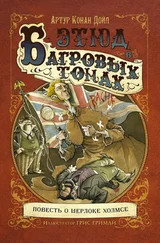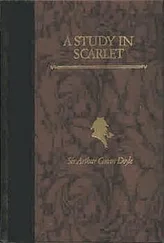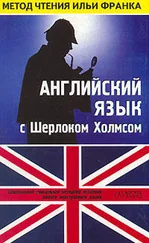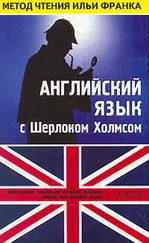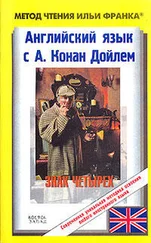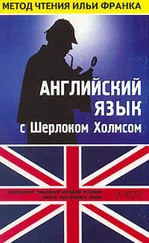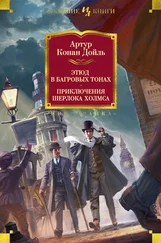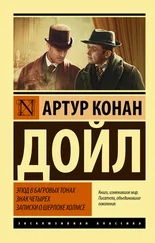ascertain [ˌæsǝˈteɪn], carriage [ˈkærɪʤ], gauge [ɡeɪʤ], growler [ˈɡraulǝ], brougham [ˈbru:ǝm]
"I understand," said I.
"Now this was a case in which you were given the result and had to find everything else for yourself. Now let me endeavour to show you the different steps in my reasoning. To begin at the beginning. I approached the house, as you know, on foot, and with my mind entirely free from all impressions. I naturally began by examining the roadway, and there, as I have already explained to you, I saw clearly the marks of a cab, which, I ascertained by inquiry, must have been there during the night. I satisfied myself that it was a cab and not a private carriage by the narrow gauge of the wheels. The ordinary London growler is considerably less wide than a gentleman's brougham.
"This was the first point gained (это было первым звеном: «это было первое выигранное очко»; to gain — добывать, зарабатывать; выигрывать) . I then walked slowly down the garden path (я затем медленно прошел по дорожке сада) , which happened to be composed of a clay soil (которая, благодаря случаю, проходила по глинистой почве: «состояла из глинистой почвы»; to compose — составлять) , peculiarly suitable for taking impressions (что особенно хорошо сохраняет следы: «особенно подходящей для запечатления отпечатков») . No doubt it appeared to you to be a mere trampled line of slush (вам, конечно, она показалась просто истоптанной полоской грязи; line — линия; черта; slush — грязь, слякоть; жижа) , but to my trained eyes every mark upon its surface had a meaning (но для моего тренированного глаза каждая отметка на ее поверхности имела значение) . There is no branch of detective science which is so important and so much neglected (нет отрасли науки сыска настолько важной и настолько пренебрегаемой) as the art of tracing footsteps (как искусство читать следы; to trace — следить; обнаружить; разыскать) . Happily, I have always laid great stress upon it (к счастью, я всегда уделял этому особое внимание: «придавал большое значение»; stress — акцент; значение) , and much practice has made it second nature to me (а благодаря большой практике это стало для меня второй натурой) . I saw the heavy footmarks of the constables (я увидел глубокие отпечатки констеблей) , but I saw also the track of the two men who had first passed through the garden (но я также увидел и следы двух человек, которые раньше прошли через сад) . It was easy to tell that they had been before the others (легко было сказать, что они прошли раньше других) , because in places their marks had been entirely obliterated by the others coming upon the top of them (потому что местами их следы полностью терялись под следами других, наложившихся на них; to obliterate —удалять; полностью уничтожать; top — вершина, верх) . In this way my second link was formed (таким образом сформировалось мое второе звено) , which told me that the nocturnal visitors were two in number (а именно: «которое сказало мне», что ночных посетителей было двое: «посетители были двое числом») , one remarkable for his height (один, примечательный своим ростом) (as I calculated from the length of his stride (который я вычислил по длине его шага) ), and the other fashionably dressed (а другой изысканно одетый) , to judge from the small and elegant impression left by his boots (судя по узким, изящным отпечаткам его туфель) .
peculiarly [pɪˈkju:lɪǝlɪ], surface [ˈsǝ:fɪs], entirely [ɪnˈtaɪǝlɪ]
"This was the first point gained. I then walked slowly down the garden path, which happened to be composed of a clay soil, peculiarly suitable for taking impressions. No doubt it appeared to you to be a mere trampled line of slush, but to my trained eyes every mark upon its surface had a meaning. There is no branch of detective science which is so important and so much neglected as the art of tracing footsteps. Happily, I have always laid great stress upon it, and much practice has made it second nature to me. I saw the heavy footmarks of the constables, but I saw also the track of the two men who had first passed through the garden. It was easy to tell that they had been before the others, because in places their marks had been entirely obliterated by the others coming upon the top of them. In this way my second link was formed, which told me that the nocturnal visitors were two in number, one remarkable for his height (as I calculated from the length of his stride), and the other fashionably dressed, to judge from the small and elegant impression left by his boots.
"On entering the house this last inference was confirmed (когда я вошел в дом, эта моя последняя догадка подтвердилась; inference — вывод, умозаключение; догадка, предположение; to infer — заключать; делать /логический/ вывод; делать предположение, высказывать догадку) . My well-booted man lay before me (мой человек в изящных туфлях: «хорошо обутый» лежал передо мной) . The tall one, then, had done the murder, if murder there was (следовательно, высокий совершил убийство, если убийство имело место) . There was no wound upon the dead man's person (на теле мертвого не было ран) , but the agitated expression upon his face assured me (но взволнованное выражение его лица ясно мне сказало; to assure — убеждать) that he had foreseen his fate before it came upon him (что он предвидел свою участь до того, как она его настигла) . Men who die from heart disease, or any sudden natural cause (у умирающих от сердечного приступа или по другой внезапной естественной причине) , never by any chance exhibit agitation upon their features (никогда ни при каких обстоятельствах не остается на лице потрясенное выражение; to exhibit — показывать; выказывать; agitation — волнение; возбуждение; тревога; потрясение) . Having sniffed the dead man's lips (понюхав губы покойного) I detected a slightly sour smell (я заметил чуть кисловатый запах) , and I came to the conclusion that he had had poison forced upon him (и пришел к выводу, что его заставили выпить яд) . Again, I argued that it had been forced upon him (опять же, я пришел к выводу, что он был принужден его выпить) from the hatred and fear expressed upon his face (по выражению ненависти и страха, застывшем на лице: «по ненависти и страху, выраженных на его лице») . By the method of exclusion, I had arrived at this result (методом исключения я пришел к этому результату) , for no other hypothesis would meet the facts (так как никакая другая гипотеза не согласовывалась с фактами) . Do not imagine that it was a very unheard of idea (не думайте, что это была такая уж неслыханная идея) . The forcible administration of poison is by no means a new thing in criminal annals (насильственное принятие яда никоим образом не новость в анналах преступности; administration — применение) . The cases of Dolsky in Odessa (случаи Дольского в Одессе) , and of Leturier in Montpellier (и Летурье в Монпелье) , will occur at once to any toxicologist (сразу придут на ум любому токсикологу; to occur — случаться; приходить на ум) .
Читать дальше

